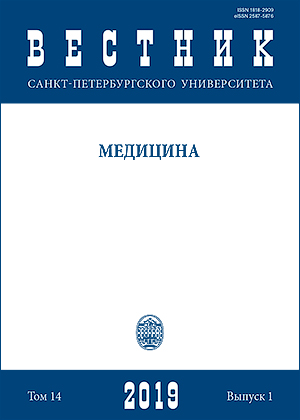Auditory brainstem and cognitive evoked potentials in assessment of brain functional status in patients with ischemic stroke
DOI:
https://doi.org/10.21638/11701/spbu10.2019.103Аннотация
Current research aimed to investigate informational content of brainstem acoustic evoked potentials (BAEPs) and auditory cognitive event-related potential — mismatch negativity (MMN) in assessment of brain functional status and cognitive functions in patients with ischemic stroke. MMN is a component of auditory event-related potential with peak latency at 100–250 ms, which reflects automatic process of difference detection between stimuli and neurodynamic processes in auditory cortex at pre-attentive stage. Clinical and neurophysiological examination, including registration of BAEPs and MMN was performed for 22 patients (12 — with ischemic stroke in carotid circulation, 10 — without cerebrovascular diseases). According to results obtained using scales of MMSE, FAB, test with 10 words repetition and Schulte tables, patients with IS demonstrated cognitive impairment as compared to control group. During BAEPs examination, functional changes in brainstem were observed (increased latency of wave V and elongation of interpeak intervals III-V on both sides and III–V ipsilaterally) in patients with ischemic stroke. Also they demonstrated increased peak latency and decreased amplitude of MMN. It points at a decline in auditory discrimination accuracy, shortened lifetime of memory traces and deficit in involuntary attention switching and also indicates of cognitive impairment.
Ключевые слова:
ischemic stroke, cognitive impairment, mismatch negativity, acoustic brainstem evoked potentials, auditory evoked potentials
Скачивания
Библиографические ссылки
References
https://doi.org/10.1016/j.clinph.2007.04.026
https://doi.org/10.1016/j.biopsycho.2016.01.011
Загрузки
Опубликован
Как цитировать
Выпуск
Раздел
Лицензия
Статьи журнала «Вестник Санкт-Петербургского университета. Медицина» находятся в открытом доступе и распространяются в соответствии с условиями Лицензионного Договора с Санкт-Петербургским государственным университетом, который бесплатно предоставляет авторам неограниченное распространение и самостоятельное архивирование.




